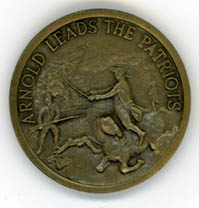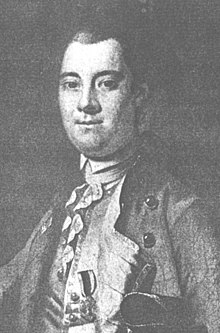 04-27-15, 11:25 AM
04-27-15, 11:25 AM
|
#724
|
|
Gefallen Engel U-666
Join Date: Jul 2013
Location: On a tilted, overheated, overpopulated spinning mudball on Collision course with Andromeda Galaxy
Posts: 28,039
Downloads: 22
Uploads: 0
|
 Warcrimes and turncoats & Connecticutt's only battle
Warcrimes and turncoats & Connecticutt's only battle
1777: The revolutionary battle of Ridgefield Connecticutt takes place. On April 27, 1777, American forces under the command of Major General David Wooster attacked the retreating British troops under Major General William Tryon in Ridgefield. In anticipation of Tryon’s return march to Long Island Sound after the April 25/26 attack on Danbury, a important Rebel depot. Wooster, GEN Benedict Arnold (still on our side ) and General Gold S. Silliman deployed their forces of militia and members of the Continental Army farther westward. While Wooster attacked Tryon from the rear, Arnold and his men set up defences at the north end of Ridgefield’s town center. It was here that the fiercest of the fighting occurred. General Wooster was wounded-dying 5 days later; and Arnold, his horse shot from under him, escaped in a hail of musket balls having killed a British soldier trying to bayonet him while pinned under the horse with his pistol. "His hairbreadth escape was a testament to what England's Annual Register of 1777 called his "usual intrepidity." A British officer on the scene conceded only that Arnold, like Wooster before him, had "opposed us with more obstinacy than skill," a statement of begrudging respect." In 1977 the town of Ridgefield did a rather extraordinary thing: It issued silver and bronze medals commemorating General Benedict Arnold and his leadership at the Battle of Ridgefield ) and General Gold S. Silliman deployed their forces of militia and members of the Continental Army farther westward. While Wooster attacked Tryon from the rear, Arnold and his men set up defences at the north end of Ridgefield’s town center. It was here that the fiercest of the fighting occurred. General Wooster was wounded-dying 5 days later; and Arnold, his horse shot from under him, escaped in a hail of musket balls having killed a British soldier trying to bayonet him while pinned under the horse with his pistol. "His hairbreadth escape was a testament to what England's Annual Register of 1777 called his "usual intrepidity." A British officer on the scene conceded only that Arnold, like Wooster before him, had "opposed us with more obstinacy than skill," a statement of begrudging respect." In 1977 the town of Ridgefield did a rather extraordinary thing: It issued silver and bronze medals commemorating General Benedict Arnold and his leadership at the Battle of Ridgefield    A British cannon ball is still embedded in the wall of the local tavern. British general Tryon (former provincal governor of North Carolina and New York> A British cannon ball is still embedded in the wall of the local tavern. British general Tryon (former provincal governor of North Carolina and New York>  He won the battle: The expedition was a tactical success for the British forces, but their actions in pursuing the raid galvanized Patriot support in Connecticut. While the British again made raids on Connecticut's coastal communities (including a second raid by Tryon in 1779 and a 1781 raid led by Arnold after his defection to the British side), they made no more raids that penetrated far into the countryside. Tryon's policies during the Revolutionary War were described as savagely brutal by persons on both sides of the conflict. Although he has been described as a tactful and competent administrator who improved the colonial postal service, Tryon became unpopular being overly harsh in his conduct of the war in the neutral ground in New York. Tryon's desolation warfare shocked many British officers and outraged Patriots. Joseph Galloway, a leading Tory, charged that marauding and even rape was officially tolerated by the British and the Loyalists. Galloway said that "indiscriminate and excessive plunder" was witnessed by "thousands within the British lines." In a "solemn inquiry," backed by affidavits, he said, "it appears, that no less than twenty-three [rapes] were committed in one neighborhood in New Jersey; some of them on married women, in presence of their helpless husbands, and others on daughters, while the unhappy parents, with unavailing tears and cries, could only deplore the savage brutality." Similarly, in New York City, citizens and officers accused Hessians, Redcoats, and Loyalists of robbing houses, raping women, and murdering civilians.' He won the battle: The expedition was a tactical success for the British forces, but their actions in pursuing the raid galvanized Patriot support in Connecticut. While the British again made raids on Connecticut's coastal communities (including a second raid by Tryon in 1779 and a 1781 raid led by Arnold after his defection to the British side), they made no more raids that penetrated far into the countryside. Tryon's policies during the Revolutionary War were described as savagely brutal by persons on both sides of the conflict. Although he has been described as a tactful and competent administrator who improved the colonial postal service, Tryon became unpopular being overly harsh in his conduct of the war in the neutral ground in New York. Tryon's desolation warfare shocked many British officers and outraged Patriots. Joseph Galloway, a leading Tory, charged that marauding and even rape was officially tolerated by the British and the Loyalists. Galloway said that "indiscriminate and excessive plunder" was witnessed by "thousands within the British lines." In a "solemn inquiry," backed by affidavits, he said, "it appears, that no less than twenty-three [rapes] were committed in one neighborhood in New Jersey; some of them on married women, in presence of their helpless husbands, and others on daughters, while the unhappy parents, with unavailing tears and cries, could only deplore the savage brutality." Similarly, in New York City, citizens and officers accused Hessians, Redcoats, and Loyalists of robbing houses, raping women, and murdering civilians.'
The Cherokees had given Tryon the name of "Wolf" for his dealings in setting a boundary dispute for them in the western part of the (Carolina) colony...and they would know best perhaps...[wiki]
__________________

"Only two things are infinite; The Universe and human squirrelyness; and I'm not too sure about the Universe"
|

|

|